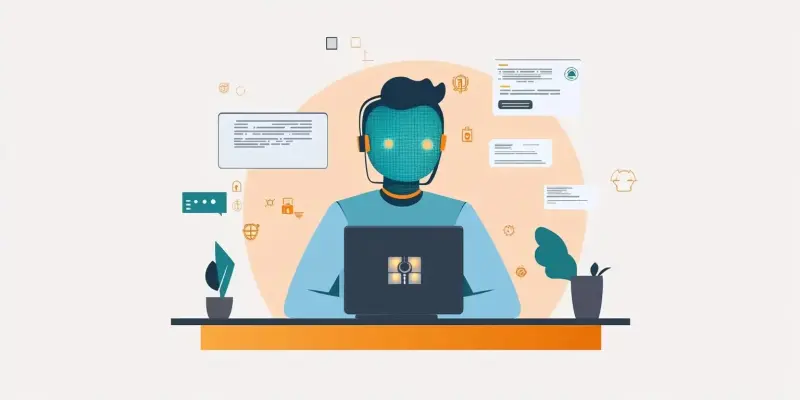Google has made significant strides in the fight against cyber threats with the announcement of Sec-Gemini v1, an innovative AI model aimed at transforming cybersecurity.Elie Burzstein and Marianna Tishchenko, key figures of the Sec-Gemini team, introduced this model to assist cybersecurity experts in managing the growing intricacies of cyber threats through advanced AI. This development promises to substantially alter the cybersecurity landscape, providing enhanced tools to fortify defenses in an era where digital vulnerabilities are increasingly exploited by malicious actors.
Addressing the Asymmetry in Cybersecurity
One of the core challenges in the field of cybersecurity is its inherent asymmetry: defenders must anticipate and mitigate all possible attacks, whereas attackers need to find and exploit just one vulnerability. This imbalance has historically rendered cybersecurity measures both laborious and prone to errors.The introduction of Sec-Gemini v1 aims to address this issue by enhancing cybersecurity workflows with sophisticated AI-powered tools, thereby boosting the overall efficiency and accuracy of cyber defense mechanisms.
Leveraging Advanced AI Capabilities
Sec-Gemini v1 builds upon the robust foundations of Google’s Gemini model, integrating near real-time cybersecurity knowledge with advanced reasoning capabilities. By leveraging data from multiple reputable sources, including Google Threat Intelligence (GTI), the Open Source Vulnerabilities (OSV) database, and Mandiant Threat Intelligence, the model is equipped to offer comprehensive and insightful analyses. These sources collectively empower Sec-Gemini v1 to excel in key areas such as incident root cause analysis, threat analysis, and vulnerability impact assessment, fundamentally enhancing its ability to support cybersecurity experts.
By synthesizing information from these diverse sources, the AI model provides an enriched context that is critical for accurate threat detection and response.This integration allows Sec-Gemini v1 not only to identify potential threats more swiftly but also to offer deeper insights into their origins and implications. This can significantly reduce the time and effort required for human analysts to interpret data, ultimately bolstering the effectiveness of their threat mitigation strategies.
Benchmarking Performance Excellence
Remarkably, Sec-Gemini v1 has demonstrated exceptional performance in standardized testing scenarios. It outperformed its counterparts by at least 11% on the CTI-MCQ benchmark, a leading measure of cybersecurity threat intelligence capabilities. Additionally, it surpassed other models by at least 10.5% on the CTI-Root Cause Mapping (CTI-RCM) benchmark, which evaluates a model’s proficiency in interpreting vulnerability descriptions, pinpointing root causes, and categorizing them based on the Common Weakness Enumeration (CWE) taxonomy.These benchmarks underscore the advanced capabilities of Sec-Gemini v1, showcasing its ability to accurately and efficiently analyze and respond to cybersecurity threats. For cybersecurity professionals, these performance metrics translate into more reliable and faster assessments, enabling a more proactive and responsive approach to threat management. This competitive edge is vital in maintaining robust defenses against the ever-evolving landscape of cyber threats.
Practical Applications and Access
Google has showcased the practical utility of Sec-Gemini v1 through real-world examples, demonstrating its effectiveness in detailed threat analysis. For instance, when queried about “Salt Typhoon,” a known threat actor, the model accurately identified the threat and provided a comprehensive description enhanced with Mandiant Threat Intelligence data. Moreover, it offered a thorough analysis of vulnerabilities associated with Salt Typhoon, sourcing data from the OSV database and delivering contextual insights derived from threat actor intelligence.
Enhancing Analyst Efficiency
Such in-depth analysis capabilities are expected to significantly aid cybersecurity analysts in evaluating risks and formulating responses more efficiently. Sec-Gemini v1’s ability to quickly parse and interpret complex data can streamline the decision-making process, reducing the burden on human analysts and allowing them to focus on higher-level strategic tasks. This efficiency gain is particularly crucial in responding to immediate threats where time is of the essence.
Collaborative Efforts for Advancement
Recognizing that the advancement of AI-driven cybersecurity measures requires collective effort, Google emphasizes the importance of industry-wide collaboration. To foster further research and innovation, Sec-Gemini v1 will be made freely accessible for research purposes to selected organizations, institutions, professionals, and NGOs. This initiative aims to promote a collaborative approach to tackling cybersecurity challenges, facilitating the development of more sophisticated and effective defense mechanisms across the industry.
Looking Ahead
Google has taken a major leap forward in the realm of cybersecurity with the launch of Sec-Gemini v1, a cutting-edge AI model designed to revolutionize the way we combat cyber threats. Spearheaded by notable tech experts Elie Burzstein and Marianna Tishchenko, the Sec-Gemini team introduced this innovative model to aid cybersecurity professionals in navigating the increasingly complex landscape of digital threats.The introduction of Sec-Gemini v1 holds the potential to significantly reshape the cybersecurity domain. By providing advanced tools for bolstering defenses, this AI model is critical in an era where digital vulnerabilities are frequently targeted by malicious hackers.As cyber threats grow more sophisticated, the need for advanced technology like Sec-Gemini v1 becomes ever more pressing, offering cybersecurity experts a powerful ally in protecting sensitive information and maintaining digital integrity. This milestone marks a pivotal moment in the ongoing battle against cybercrime, highlighting the indispensable role of AI in enhancing our security measures.

